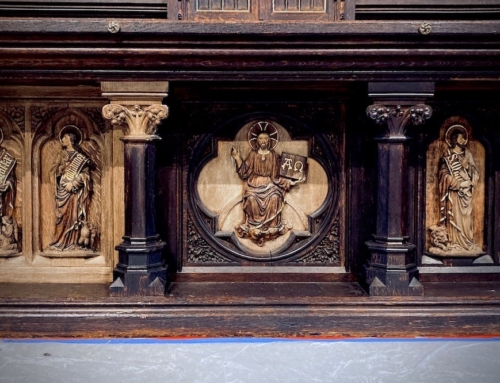My last name, “Nee,” is quite odd—terribly short and simple and, yet, somehow often mispronounced (it’s just like “knee,” by the way, and should be distinguished from its heteronym). I’m stuck with it, but that’s okay. It ties me to my roots: my family background, my heritage, and the people who have known me by that name. A given name is something to cherish. And yet, people often want to change their names. Sometimes this is meritorious—a woman marks herself as part of a new family in marriage, or a religious takes on the yoke of a new consecrated name. But other times this desire for change is for less-than-noble reasons—identity crisis and confusion, perhaps even a desire to cast off one’s past completely. These are radical examples, but I think at its root this desire aligns with the sentiment we take on at New Year’s: it’s a time of “New Year, New Me.”
For many, this “resolution” attitude might not amount to more than a short-lived diet, but that short-lived diet is aimed at changing your life. We want to cast off the identities given to us by God. At worst this is because of modernity’s false ideologies or a sense of unbridled self-creation, but it can also be due to a misplaced understanding of God’s salvation—I am totally, substantially changed by God’s grace. But this would be incorrect. God in his grace, perfects the person who is already there, weird name and all. Bearing his name on our foreheads, we are like stained glass whose original color is made radiant by the sun (see Rev 22:4–5).
Christians then are not some group of aliens separate from the human race, but are men and women who bear the mark of God in a supernatural way. Let’s take the “highest honor of our race” in the Blessed Virgin Mary. The Church celebrates the first day of the new year with the greatest name bestowed upon any of God’s lowly servants—the Mother of God. If you think you have a difficult name, get this: a whole ecumenical council was fought over this one. The heretic bishop Nestorius rejected the title of Theotokos—rendered as “God-bearer” from the Greek—causing the Council of Ephesus to be called in 431. Here, Nestorius was condemned, and the doctrine of the hypostatic union (Jesus’ possessing both human and divine natures) was upheld. Jesus is God, and Mary is his mother. This is why we call her the Theotokos, the Mother of God. This name is given to her for eternity, yet it does not destroy her ordinary life she faithfully lived on earth. Mary, the young girl hidden away in Nazareth, is the same Mary exalted forever in heaven.
The new year always makes us yearn for the “new”—and when we say “new” we mean a fresh start. Yet this desire often blots out what God has already given us. Instead of cold-turkey diets fueled by self-loathing, take a look this new year at what God has given you in the last. Even in your trials and sins, God reveals to you where your desires are, helping you see you: the person he wishes to draw to himself, the person he created as good. This self-knowledge is necessary for purifying those desires, so that you can bear the name of Jesus, the one “you seek when you dream of happiness” (John Paul II).
While we look ahead to the new year, don’t let be forgot the “auld acquaintance” of who you are and where you come from. Like Mary, look to God, who truly “makes all things new” (Rev 21:5).
“Jesus Christ is the same yesterday, today, and forever” (Heb 13:8; communion antiphon for Mary, Mother of God).
✠
Image: Icon of the Theotokos






